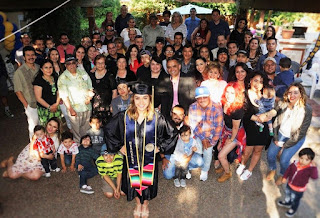Jessica: Bridging barriers
Q: What is it like to be the first generation college student in your family?
It is both a blessing and a burden. It is awesome to be somewhat a role model to your younger family members because you give them hope in achieving their goals. However it is also a burden since you have to figure things out for yourself. You are first one to explore opportunities and find your path. As exciting as that sounds, it can become overwhelming and exhausting. Especially when you don't have a guide. The current misleading stereotype of what is an immigrant completely undermines the true struggle of an immigrant. They know what it is to not have support; they know what it is to not have economic resources; they know what its like to work low paid jobs as long as it brings food to the table. And despite all these limitations, I am witness that these individuals are the first to lend a hand to those that are fighting the same battle. An immigrant strives for the betterment of not only him/herself but also of his/her family, friends and neighbors. In my opinion that is the true definition of what it means to be member of a community.
Q: Please tell us a little bit more about your family and where you're from.
I am a first generation Mexican-American. I come from a very large family who all migrated to this country between the 80's and early 90's. My mother migrated to this country at an early age and was able to pursue higher education despite the cultural and language barriers she faced as she grew up in Oakland. My father migrated as a young adult and unfortunately did not share my mother's luck. He gained his living as a house painter and musician. When I was 11, my family moved to Guadalajara Jalisco, Mexico. There I was able to reconnect with my roots and solidify my Mexican identity. In 2010 I returned to the US and experienced a drastic culture shock. I found that many of the young adults of my generation did not speak Spanish while those of an older generation spoke fluent Spanish. This was only a small indication of not only a language gap, but also a cultural gap between my Latino community. As I made this realization, I then felt responsible to do my part in lessening this gap by sharing a little bit of my experience of living in Mexico and try to reconnect individuals of different generations.
Q: How was your very first week in the US?
Coming back at the age of 18, I was excited to start a new chapter of my life, however after my first week I started to feel isolated and feeling like I did not belong. I was not connecting with those of my generation and felt a lack of communication and unity.
Q: How did you first become an interpreter? How was your first interpretation session?
My first experience as an interpreter was when I visited my grandparents and they needed my help to order more prescription medicine. My experience later grew when I accompanied my grandmother to her doctor's checkup. It was at this moment that I realized how much information is lost with a language barrier. My grandmother was surprised at what the doctor would say and I saw that having me present allowed my grandmother to express all her doubts and concerns which in turn allowed the doctor to give a through medical analysis. At the end, the doctor said that this was the first time my first grandmother had given so much detail of her symptoms.
Q: What are some volunteering or community activities you have participated in?
As part of VHIO (i.e: the Volunteer Health Interpreter Organization) I volunteered as a Spanish interpreter for the San Jose flee market health fair, health events and translated documents for the Senior Center in Oakland. Outside of VHIO, I served as an Oakland explorer and worked alongside the Oakland police department and served as security and hosts for community events such as turkey give aways and Christmas dinner for my Oakland neighborhood.
"It was at this moment that I realized how much information is lost with a language barrier."
By: Anh-Thu Ho
Date: Mon Sep 12 2016
Date: Mon Sep 12 2016




Comments
Post a Comment